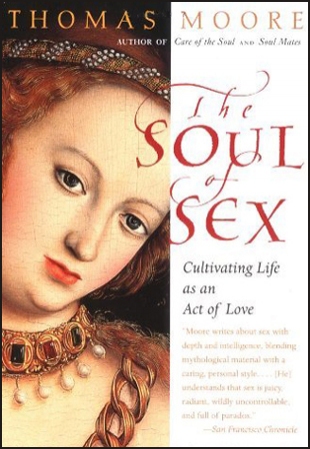"When we actually meet someone who seems to be a potential lover or mate, we may see them surrounded by fantasy. They glow for us, though they do not for their friends. The lover becomes a double star — one radiant branches out from their real presence, while another shines from an unknown source, intensifying the total effect.
"The soul's loves seem to carry on with a different tempo, with different dynamics, and with different results when compared to the ego or to the lived relationship. And so lovers talk to each other about their fathers and mothers, seeing in themselves echoes of their parents' erotic struggles. We go to movies that tell story after story about love's romantic ideals and its tragedies. A good deal of our imagination of love and sex is connected to a world of memory and fantasy, and this evidently is as it should be.
"In Eric Rohmer's film Claire's Knee (Le Genou de Clair), an intelligent, self-reflective man becomes infatuated with a young girl's knee. In Shampoo, a young man has more sex in his life than one can imagine, and yet he acts depressed and his life seems empty of pleasure. In Belle de Jour, Catherine Deneuve's character discovers to her amazement that men come to her as a prostitute to act out fantasies that have nothing at all to do with her. In Last Tango in Paris, Marlon Brando's character has a profound need to have sex with someone who is nameless. These movies all reflect fantasies that an ordinary person might have, and they show how far the life of the soul sometimes is from ordinary, rational meaning.
"Claire's Knee is an essay on mysterious desire. It was filmed on a lake surrounded by mountains, and nature is palpably and sensuously present in almost every scene. The water, Aphrodite's element, carries the subject of the story, Jerome, from place to place. With the help of his friend Aurore, an alternate name for Aphrodite, whom he describes as a magician and a sorceress, Jerome tries to be open to the desires that stir in his heart. He seems to be in complete control, until one day he happens to notice the knee of the sister of the young woman he's been flirting with. Suddenly, he loses all control, and his desire gets out of hand.
" 'She troubles me. . . .'
" 'Her body?'
" 'Yes. The way she looks. . . She arouses in me a desire yet undefined. All the stronger because it is undefined. A pure desire. A desire of nothing. I don't want to do anything but this desire bothers me. . . . The knee. It was the magnet of my desire.'
" 'It's easy. Put your hand on her knee. That's the exorcism.'
" 'You're wrong. It's the hardest thing to do.'
"In the end Jerome remains true to his inhibitions. There is no resolution, except that life goes on. The audience knows that Jerome will face more ordeals of desire as he lives his life with unusual openness and reflection. The film offers no conclusions, and that is its special virtue, because desire is unending and mysterious.
"Jerome has an extraordinary friend, a love-magus in Aurore, with whom he can talk with remarkable candor about his mysterious attraction. There we have an ordinary but crucial factor in living through our desires — honest conversation in the context of rare and intelligent friendship. With Aurore's help Jerome acts boldly on his desire, but he also holds back strongly, and this dialectic could be the key toward living with unknown desire."
Back to reading a full review of this book.
